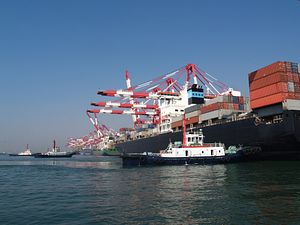Property and commodities markets in Qingdao, a coastal city in Shandong Province, have been underperforming in recent weeks. First, there was a sharp decline in property prices as the real estate bubble burst this March. Some real estate prices in Qingdao have been slashed by 20-30 percent, as developers anxiously attempt to sell off their properties. Other promotions being used by local developers include a zero down payment, the inclusion of appliances in the purchase price, and payment for referring a friend. Yet buyers have adopted a “wait and see” attitude and are not purchasing new homes.
As a second stroke of bad luck, the port of Qingdao fell under scrutiny in May over concern by international and domestic lenders that commodities stored in port warehouses were being used to repeatedly back loans from more than one lender. The collateral was allegedly pledged more than once to high status lenders, including Standard Bank Group, Citic and Citigroup. Funds were then likely used to invest in high-yield investments, particularly in real estate. Declining real estate prices and increased monitoring of collateral based borrowing laid bare this scheme. Lenders and trading companies are determined to look into the situation after port officials complete their inspection, with trading of copper, iron ore and palm oil under particular scrutiny.
Results of inquiries to date suggest that Deching Mining, a metals importing company, may be mainly responsible for this fiasco, by overpledging copper and aluminum as collateral. The company obtained over 1 billion RMB ($161 million) in loans using 100,000 tons of aluminum and 2,000 to 3,000 tons of copper in collateral. Decheng claims that the accusations are false. This imbroglio has led to commodities outflows from the Qingdao bonded zone and to declining copper prices. The port of Penglai, also in Shandong Province, has also come under investigation.
Aside from the overpledging of collateral, some companies have in recent years been engaging in commodities import fraud for the purposes of overstating the value of collateral stored in warehouses. Companies import commodities to be held in duty-free zones in exchange for a letter of credit from a lender. These commodities have at times been associated with overvaluation, as importers report higher import numbers than their underlying values using a false warehouse receipt, in order to obtain larger bank loans. Funds have mainly been used to speculate in the real estate sector.
Third, Qingdao Port International Company Limited’s initial public offering in Hong Kong on May 30 was weak, a reflection of the potential fraud crisis. The fixed-price IPO raised $377 million, with its retail portion taking up just 15 percent of the shares on offer, in a short three and a half days of bookbuilding. Funds were to be used to expand port facilities, including warehousing for metal and oil commodities. Needless to say, most of these aims will be left unmet. Qingdao’s port is the fifth largest in terms of cargo handled, but investors are waiting to learn the outcome of the commodities fraud before once again stepping up business through the port and funding port expansion.
Qingdao’s decline in (riskier) collateral-based funding due to this scandal will only feed back into the flagging real estate sector. Speculative funds are being choked, as the shadow banking sector faces increased regulation. Mortgage loans from banks, although encouraged by the People’s Bank of China starting in May, have not taken off, since property prices continue to decline; potential purchasers of primary residences are holding off until the bottom is reached.
Qingdao’s commodity and asset market troubles offer an example of how the decline in the shadow banking and real estate markets is playing out in China. It reveals that interconnected degradation is eminently possible and potentially circular, as one shock reinforces another in turn. It is likely that we will see other similar situations emerge in the near future. Qingdao also shows that after-the-fact policies such as loosening mortgage lending are too small to combat full-on market retrenchment. It is hoped that larger reform policies will stimulate economic growth where defensive economic policies cannot. Much is likely to play out through the end of this year.
Follow Sara Hsu on Twitter @SaraHsuChina
































